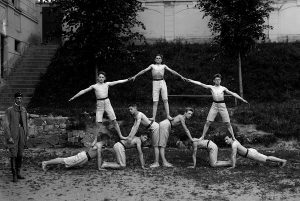 Hi all–I talked about this at the ABA meeting resource share but also wanted to blog about this in a little more detail. Apologies for the length–do reach out if you are interested in learning more and I’d be happy to walk you through what I did. In short, this was totally worth it and I felt like the class organization and teamwork reflected exactly what we are trying to achieve. Let me explain:
Hi all–I talked about this at the ABA meeting resource share but also wanted to blog about this in a little more detail. Apologies for the length–do reach out if you are interested in learning more and I’d be happy to walk you through what I did. In short, this was totally worth it and I felt like the class organization and teamwork reflected exactly what we are trying to achieve. Let me explain:
Team-Based Learning, or TBL, is a concept that I first learned that about in an article by Melissa Weresh applying TBL in the legal writing classroom. After reading Weresh’s article, I thought it would be an interesting concept to incorporate in my Alternative Dispute Resolution course. The ability for students to work together in groups is something that I have done for years, but this added a different flavor to it as the groups were for the entire semester—allowing for developing chemistry and comfort with working with the same group members for an extended period of time (much like they will once they graduate.)
Up to this last year, I would teach the ADR course in three sections (1) negotiation, (2) mediation, and (3) arbitration. Three quizzes for each section acted as “mini-capstones” to end a section. This both allowed for a more focused assessment on the content area and a clear division between the material for the students. But, I felt like students crammed for the one-time quiz as opposed to reading throughout the semester. Additionally, taking a whole class period to quiz the students and then time to review the quiz in the next class felt like too much time devoted to assessment versus learning.
So, I decided to try the TBL ideology. First, my TA’s and I divided the class into teams of 5-6 students with the intention of making them as diverse of a teams as possible. This meant a true mixture of real-world experience, degrees, demographic, and some other subjective factors. Once the students were divided into teams, these were their teams for all quizzes and most class activities.
In order to make shorter quizzes for more regular assessment and team work, I now split the material into 7 total quizzes: 1 for interviewing & counseling, 2 negotiation quizzes, 2 mediation quizzes, and 2 arbitration quizzes. This allowed for a better judgment of whether the students were grasping the information. Moreover, it allowed me to essentially “force” the student to continually read the material throughout the semester since quizzes were basically every other week.
When taking the quizzes, students would first take the quiz (no more than 10 questions) as individuals where they would have 15 minutes max to complete the quiz. Once the individual portion of the quiz was complete, the students would get into their teams and take the same quiz as a team. This allowed for the students to talk and negotiate an answer for their team portion of the quiz. Also, I used IF-AT scratch-off tests so that the students had an instant response to their answer–this meant they immediately received both their team & individual grade.
I also instituted an appeals process for teams if they felt as though a question was unfair or ambiguous. This appeals process required the appeal to be in writing and the appeals were heard and judged by my TA’s & me. The appeals system also allowed me to receive almost instant feedback on the questions that I was asking to better clarify what I wanted to accomplish with each quiz moving forward.
The experience was extremely positive. Student at the end of the semester had great feedback about the process—I really felt like the goals I had set out for the class were achieved. Their substantive learning was better in teams as they taught each other and almost always did better on the group quiz than the individual quiz. And their learning about group work was crucial. In their feedback, I asked them to tell me two key lessons they learned about working in groups. The top one was that they learned to listen—even when they might have initially reached another conclusion. They also learned the importance of everyone’s input and the usefulness of diverse teams. For example, one student noted that “Working in a team was helpful when I was confused on a question and someone had an explanation.” Additionally, another student remarked that “allowing everyone to contribute makes the team better and produces better outcomes.” And finally, “The outcome of group work is almost always better; Team work makes me a more accountable student, which will be a great mindset for entering a law firm.”
The feedback from the students and the results that I saw on the quizzes made this a valuable experience for my ADR class. I will be doing this again in the fall and am happy to help anyone else who wants to try this!
Cross posted at Indisputably.org .
